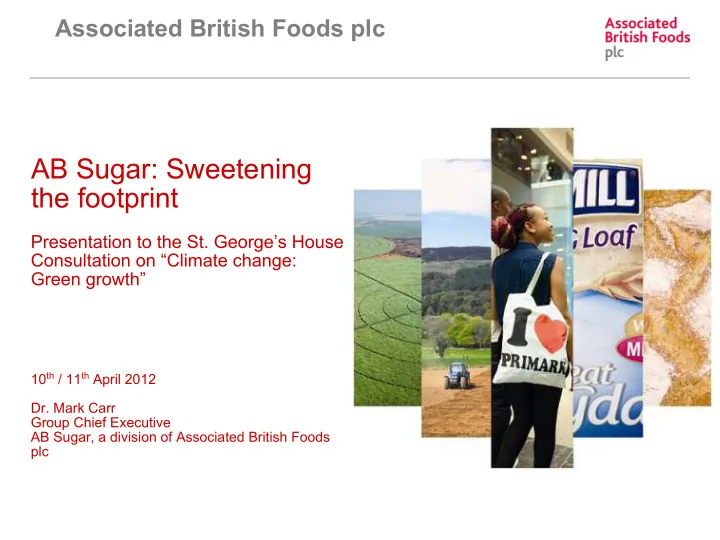

Associated British Foods plc AB Sugar: Sweetening the footprint Presentation to the St. George’s House Consultation on “Climate change: Green growth” 10 th / 11 th April 2012 Dr. Mark Carr Group Chief Executive AB Sugar, a division of Associated British Foods plc
ABF – a global presence Associated British Foods is a diversified international food, ingredients and retail group with sales of £11.1 billion and 102,000 employees in 46 countries. The Group operates through five strategic business segments: Sugar; Agriculture; Retail; Grocery; and Ingredients
Corporate objectives ● Twin financial goals: ● Sustainable real profit growth ● Long-term cash generation ● Focus energies on market segments where we can establish strong, sustainable leadership positions ● Grow organically and by acquisition in complementary activities ● Achieve high levels of operating efficiency ● Operate through a focused divisional structure in which each business: ● has an influential market position ● has sufficient scale to attract highest quality management ● has differentiated features for leveraging added value ● has potential for sustained revenue and profit growth or cash flow
What Corporate Responsibility means to ABF ● The ABF culture has always been to play a positive role in contributing to the quality of people’ s lives by providing food and clothing in ways that are socially and environmentally responsible ● Commitment to sustainability is manifest in four overarching business principles which govern what we do and how we act: ● managing our environmental impact; ● taking care of our people; ● fostering ethical business relationships; and ● being good neighbours ● Each business is required to deliver their responsibilities while paying attention to local circumstances and by being innovative
Where does sugar fit in ABF? Sugar 2011 2010 Change 2,134 Revenue £m 1,941 +10% Operating profit £m 315 240 +31% One of the world’s largest sugar producers operating in 10 countries (Europe, Africa, China), employing 42,000 people, with a capacity of ~ 5.5mtpa; current production c. 4.1 – 4.4 mtpa Our UK beet sugar factories typically produce over 1mt of beet sugar annually. Azucarera in Spain produces approx 400kt of beet sugar each year with a further refining capacity of 400kt In China, 5 cane sugar mills and 7 beet sugar factories have a capacity to produce 850kt of sugar Africa’s largest sugar producer with agricultural and production operations in 6 countries and annual production capacity of some 1.8mt
Green growth: The example of sugar
Leveraging our advanced manufacturing capabilities in both beet… British Sugar’s Wissington bio-refinery is the gold standard
Page The world’s leading sugar business
Page The world’s leading sugar business
…leverages our advanced manufacturing capabilities…in beet Wissington – our integrated biorefinery Page The world’s leading sugar business
…and cane…
…deliver sustainable outcomes… for example in British Sugar through… Responsible and efficient use of raw materials Reduced energy requirements pt/sugar by 25% since 1990. Export 700,000 MWh of ● electricity Carbon Trust certified carbon footprints (0.6 g CO2 per gram of granulated sugar). ● Agriculture accounts for around 38% of this. British Sugar has targeted a 10% reduction by 2020 Supporting improvements throughout the supply chain Energy consumption GJ%WE Work with around 4,000 growers on sustainable intensification – jointly investing over £1.8 ● m p.a. in R&D Since 1982: Pesticide usage reduced by 60%, N by 40% and P by 70% ● Average beet yields have increased by 60% to an average of 11 tonnes of sugar ● per hectare Co-product development First UK bioethanol plant (70 m litres) – GHG lifecycle savings of 70% relative to petrol Relative Yield Increase 1986-2011 ●
…for example in our African operations through… Focus on renewables Bagasse (fibrous residue left after sugar extraction) used as boiler fuel at all Illovo’s sugar factories ● Invested in cane trash handling to enable use of 33,000 tonnes of additional biomass feedstock in Swaziland and ● Malawi 89% of Illovo’s energy requirements is now produced from renewable sources ● Produces a range of downstream co-products including furfural, ethanol and lactulose. ● Social Investment Illovo is a long-term partner in the communities in which it operates with a well-developed social investment ● programme e.g. Access to health care to all employees and their dependents through network of 24 primary health care ● clinics and 4 hospitals 27 schools in 5 countries benefit from direct support ●
Sustainability – part of the bigger picture The Ubombo case study Everything But Arms agreement (2001) allowed duty- ● free imports of raw sugar to the EU from the Least Developed Countries from 1 October 2009 The EU identified that many LDCs lacked the ● infrastructure to let them seize these new trading opportunities EU invested in the Lubovane dam and canal system, ● linked to the Lower Usuthu Smallholder Irrigation Project to enable agricultural development In tandem, we worked closely with local farmers to ● grow cane and expand the Ubombo sugar factory’s capacity by 100kt to over 300kt This investment included new boilers, which produce ● more power from biomass, and is planned to feed 55 GWh to Swaziland’s national grid each year. The combination of the Lower Usuthu Smallholder Irrigation Project and the Ubombo factory expansion has already created 1,500 jobs and is expected to provide economic benefits to 28,000 people
Thank you
Recommend
More recommend